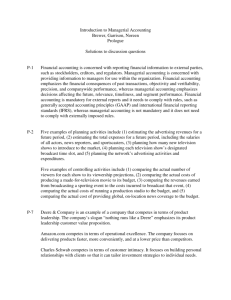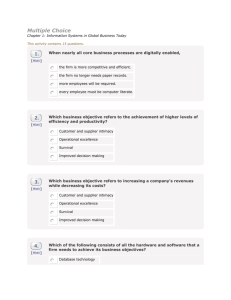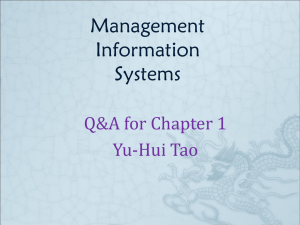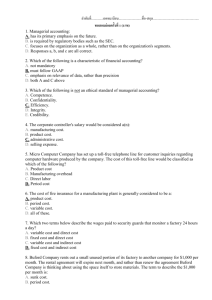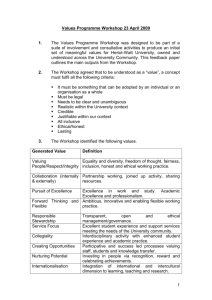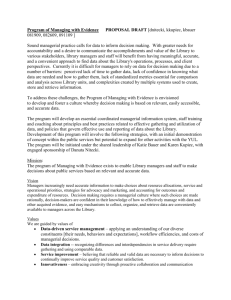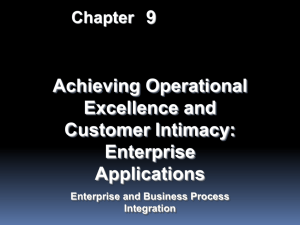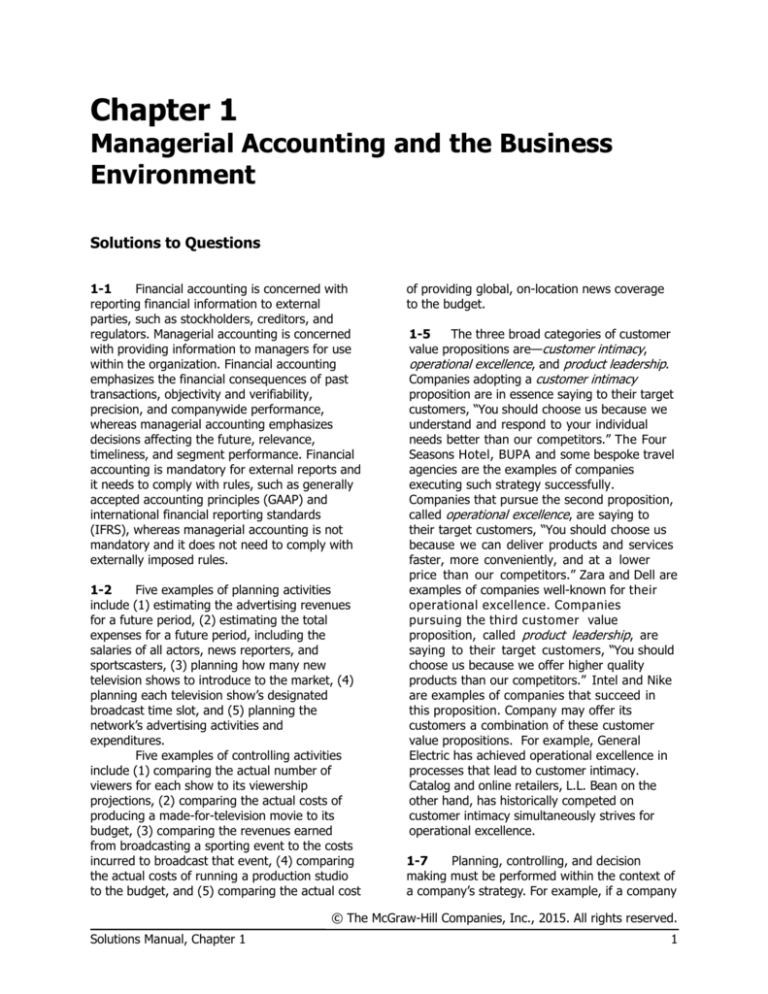
Chapter 1
Managerial Accounting and the Business
Environment
Solutions to Questions
1-1
Financial accounting is concerned with
reporting financial information to external
parties, such as stockholders, creditors, and
regulators. Managerial accounting is concerned
with providing information to managers for use
within the organization. Financial accounting
emphasizes the financial consequences of past
transactions, objectivity and verifiability,
precision, and companywide performance,
whereas managerial accounting emphasizes
decisions affecting the future, relevance,
timeliness, and segment performance. Financial
accounting is mandatory for external reports and
it needs to comply with rules, such as generally
accepted accounting principles (GAAP) and
international financial reporting standards
(IFRS), whereas managerial accounting is not
mandatory and it does not need to comply with
externally imposed rules.
1-2
Five examples of planning activities
include (1) estimating the advertising revenues
for a future period, (2) estimating the total
expenses for a future period, including the
salaries of all actors, news reporters, and
sportscasters, (3) planning how many new
television shows to introduce to the market, (4)
planning each television show’s designated
broadcast time slot, and (5) planning the
network’s advertising activities and
expenditures.
Five examples of controlling activities
include (1) comparing the actual number of
viewers for each show to its viewership
projections, (2) comparing the actual costs of
producing a made-for-television movie to its
budget, (3) comparing the revenues earned
from broadcasting a sporting event to the costs
incurred to broadcast that event, (4) comparing
the actual costs of running a production studio
to the budget, and (5) comparing the actual cost
of providing global, on-location news coverage
to the budget.
1-5
The three broad categories of customer
value propositions are—customer intimacy,
operational excellence, and product leadership.
Companies adopting a customer intimacy
proposition are in essence saying to their target
customers, “You should choose us because we
understand and respond to your individual
needs better than our competitors.” The Four
Seasons Hotel, BUPA and some bespoke travel
agencies are the examples of companies
executing such strategy successfully.
Companies that pursue the second proposition,
called operational excellence, are saying to
their target customers, “You should choose us
because we can deliver products and services
faster, more conveniently, and at a lower
price than our competitors.” Zara and Dell are
examples of companies well-known for their
operational excellence. Companies
pursuing the third customer value
proposition, called product leadership, are
saying to their target customers, “You should
choose us because we offer higher quality
products than our competitors.” Intel and Nike
are examples of companies that succeed in
this proposition. Company may offer its
customers a combination of these customer
value propositions. For example, General
Electric has achieved operational excellence in
processes that lead to customer intimacy.
Catalog and online retailers, L.L. Bean on the
other hand, has historically competed on
customer intimacy simultaneously strives for
operational excellence.
1-7
Planning, controlling, and decision
making must be performed within the context of
a company’s strategy. For example, if a company
© The McGraw-Hill Companies, Inc., 2015. All rights reserved.
Solutions Manual, Chapter 1
1
that competes as a product leader plans to grow
too quickly, it may diminish quality and threaten
the company’s customer value proposition. A
company that competes in terms of operational
excellence would select control measures that
focus on time-based performance, convenience,
and cost. A company that competes in terms of
customer intimacy may decide against
outsourcing employee training to cut costs
because it might diminish the quality of
customer service.
1-14 Ethical behavior is the lubricant that
keeps the economy running. Without that
lubricant, the economy would operate much less
efficiently—less would be available to
consumers, quality would be lower, and prices
would be higher.
1-15 Corporate governance is the system
by which a company is directed and
controlled. If properly implemented, the
corporate governance system should provide
incentives for the board of directors and top
management to pursue objectives that are in
the interests of the company’s owners and its
stakeholders and it should provide for
effective monitoring of performance.
Effective corporate governance enhances
stockholders’ and stakeholders’ confidence
that a company is being run in their best
interests rather than in the interests of top
managers.
1-16 Enterprise risk management is a process
used by a company to help identify the risks that
it faces and to develop responses to those risks
that enable the company to be reasonably
assured of meeting its goals. Even with a
sophisticated enterprise risk management
system, a company cannot guarantee all risks
being eliminated. Nonetheless, many companies
understand that managing risks is a superior
alternative to reacting, perhaps too late, to
unfortunate events.
© The McGraw-Hill Companies, Inc., 2015. All rights reserved.
2
Managerial Accounting, Asia Global Edition
Solutions to Exercise
Exercise 1-3 (30 minutes)
Examples of Decisions
Application in a University Setting
What should we be selling?
What products and services should
be the focus of our marketing
efforts?
What new products and services
should we offer?
What prices should we charge for
our products and services?
What products and services should
we discontinue?
Who should we be serving?
Who should be the focus of our
marketing efforts?
Who should we start serving?
Who should pay price premiums or
receive price discounts?
Who should we stop serving?
How should we execute?
How should we allocate our
marketing resources, among our
undergraduate programs, our
graduate programs, our research
accomplishments, and our athletic
programs?
Should we introduce a new major
for undergraduate students?
What prices should we establish for
our travel abroad programs?
Should we discontinue our MBA
program?
How much of our marketing budget
should we channel towards
attracting undergraduate students
versus graduate students?
Should we introduce on-line
programs that enable us to serve
customers across the globe?
How much should we charge for
out-of-state tuition?
Which one of our branch campuses
should we close?
How should we supply our parts and What portion of our faculty should
services?
be adjunct faculty?
How should we expand our
Should we increase our average
capacity?
class size to accommodate more
students?
How should we reduce our capacity? Should we cut costs by eliminating
administrative jobs or faculty jobs?
How should we improve our
Should we increase our research
efficiency and effectiveness?
expectations for our faculty?
© The McGraw-Hill Companies, Inc., 2015. All rights reserved.
Solutions Manual, Chapter 1
3
Exercise 1-4 (20 minutes)
1. Failure to report the obsolete nature of the inventory would violate the
IMA’s Statement of Ethical Professional Practice as follows:
Competence
• Perform duties in accordance with relevant technical standards.
Generally accepted accounting principles (GAAP) require the writedown of obsolete inventory.
• Prepare decision support information that is accurate.
Integrity
• Mitigate actual conflicts of interest and avoid apparent conflicts of
interest.
• Refrain from engaging in any conduct that would prejudice carrying
out duties ethically.
• Abstain from activities that would discredit the profession.
Credibility
• Communicate information fairly and objectively.
• Disclose all relevant information.
• Hiding the obsolete inventory impairs the objectivity and relevance of
financial statements.
Members of the management team, of which Perlman is a part, are
responsible for both operations and recording the results of operations.
Because the team will benefit from a bonus, increasing earnings by
ignoring the obsolete inventory is clearly a conflict of interest.
Furthermore, such behavior is a discredit to the profession.
2. As discussed above, the ethical course of action would be for Perlman to
insist on writing down the obsolete inventory. This would not, however,
be an easy thing to do. Apart from adversely affecting her own
compensation, the ethical action may anger her colleagues and make
her very unpopular. Taking the ethical action would require considerable
courage and self-assurance.
© The McGraw-Hill Companies, Inc., 2015. All rights reserved.
4
Managerial Accounting, Asia Global Edition

